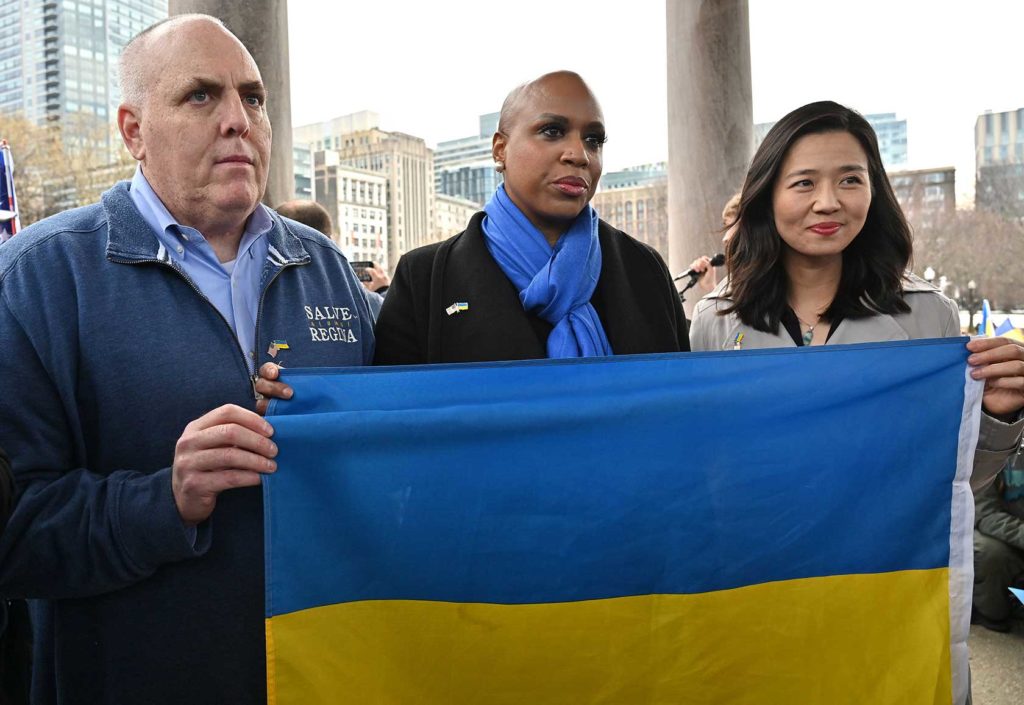
Amid the ongoing humanitarian crisis in Ukraine, Mayor Michelle Wu has expressed her office’s support for those not only on the front lines of the conflict but also Ukrainians living throughout Boston. Over the weekend, Wu hosted an informational session with Yusufi Vali, director of the Mayor’s Office for Immigrant Advancement (MOIA), to discuss Ukraine and “how Bostonians can support global communities in crisis,” before attending a rally in support of the embattled country Sunday.
“Boston is a city where uplifting and investing in our immigrant families … is investing in the City of Boston,” she said.
The discussion between Vali and Wu was held Friday via Instagram live, and was meant in part to help quell fears amongst immigrant residents facing uncertainty in their home country.
“I’m an immigrant myself, from India,” Vali said as an introduction on the social media platform.
He recounted the story of his parents, 44 and 40 when they came to the US, struggling to make ends meet in the first few years. His father, with a background in engineering and accounting, worked temp jobs when the family immigrated.
“How do we really help our foreign-born residents really onboard into Boston in a way that they can thrive economically, civically, and culturally, and how their kids can thrive and hopefully one day also work in city government, like you and me,” he said.
Wu’s own parents came to the US from Taiwan about a year before she was born, and while she touched on the importance of supporting families like hers, she also pivoted the conversation to how the city and residents can show support for Ukraine.
She asked Vali to highlight President Biden’s announcement of Temporary Protected Status (TPS) for Ukrainian immigrants in the United States, in addition to emphasizing how to support neighbors with ties to Ukraine who are permanent citizens.
According to the White House, if you are Ukrainian, and you were in the country on March 1 or before, this would allow you to stay in the United States for an additional 18 months.
However, “the key thing to know here is that it’s been announced, but the application process hasn’t fully been delineated yet, by the US government,” Vali said. “And so we, as MOIA, are following it, and if you follow us on Instagram, Twitter, and Facebook, we’ll get that information out.”
He added that when more information does become available, the office is planning a webinar to ensure people know how to apply for TPS, and how to take advantage of options to get family members to United States — a feat which is still unclear and limited for the time being.
Vali also said the office would be keeping a close eye on foreign currency and what that could mean for some local Ukrainian students who may face difficulties paying for tuition and housing in the wake of economic collapse in their home country.
Wu, in response, said the city will continue to share resources with residents in need.
“Here in Boston, we can’t control for everything, right, we can’t sometimes even make sense of so much of what is happening in this moment across our planet. We can do our best to model and build that beloved community that we want to see happen here in our city,” she said.
This is not the first time the city has made an effort to assist immigrants with crises back home. Over the summer, city officials moved to provide $600,000 in funding to Haitian arrivals fleeing conflict. In turn, the state put in $8 million of funding into a fund for Haitian immigrants taking advantage of TPS.
Vali made a point Friday to say he hopes the city can continue supporting immigrants struggling worldwide.
“I think what has happened with Ukraine, how quickly TPS was granted, is really a model for our government to follow and I think that many of us want to see that that model is now applied to a whole host of other conflicts that are happening across across the globe, and in all parts of the world,” he said.
Vali went on to thank the Mayor for standing in solidarity and urging the federal government to offer asylum to Ukrainians — she joined mayors across the US in the early days of the crisis in advocating for TPS.
“I think we can take that example, and really run with it — if you know someone that’s Ukrainian, reach out to them. Their family, friends are an incredible danger,” Vali said. “There is a sense of anxiety and fear. And that’s part of what we’ve been hearing from our community partners. And so reach out to folks individually, trust me, it does make a difference.”
In a show of solidarity, thousands, Ukrainian and not, came out over the weekend to rally then march across the city in support of Ukraine. Organized by the Ukrainian Cultural Center of New England, marchers were joined by elected officials including Wu and Congresswoman Ayanna Pressley, who told the crowd, “this is not a faceless war,” evoking the violent imagery that has been seen coming out of the frontlines.
On Friday, Wu commended previous actions and marches, and also commented on the need for visible solidarity.
“It is fundamental for us right here in Boston, to build community and to be in solidarity with what’s happening affecting our community members right here in the city, that is that is taking place in other parts of the world,” she said. “And that is just as relevant when it comes to international crises that are spilling over into the health and wellbeing and security and safety of our residents or family members and loved ones of our residents.”
At Sunday’s march she echoed this sentiment, telling the crowd “this is Boston’s cause,” and “we will be here up until the very day that it takes to see democracy prevail.”






